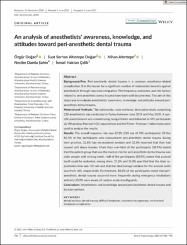An analysis of anesthetists' awareness, knowledge, and attitudes toward peri-anesthetic dental trauma

View/
Access
info:eu-repo/semantics/embargoedAccessDate
03.07.2021Author
Doğan, ÖzgürAltıntepe Doğan, Suat Serhan
Altıntepe, Nihan
Şahin, Necibe Damla
Çelik, İsmail Haktan
Metadata
Show full item recordCitation
Doğan, Ö., Altıntepe Doğan, S. S., Altıntepe, N., Şahin, N. D., & Çelik, İ. H. (2021). An analysis of anesthetists' awareness, knowledge, and attitudes toward peri‐anesthetic dental trauma. Dental Traumatology, 37(6), 786-794.Abstract
Background/Aim: Peri-anesthetic dental trauma is a common anesthesia-related complication. It is the reason for a significant number of malpractice lawsuits against anesthetists through insurance companies. The frequency, outcomes, and risk factors related to peri-anesthetic dental trauma have been well documented. The aim of this study was to evaluate anesthetists' awareness, knowledge, and attitudes toward peri-anesthetic dental trauma.
Material and Methods: This nationwide, cross-sectional, descriptive study comprising 220 anesthetists was conducted in Turkey between June 2019 and May 2020. A specific questionnaire was created using Google Forms and delivered to 591 participants via WhatsApp. Pearson's Chi-squared test and the Fisher-Freeman-Halton tests were used to analyze the results.
Results: The overall response rate was 37.2% (220 out of 591 participants). Of the 80.5% of the participants who encountered peri-anesthetic dental trauma during their practice, 32.8% had encountered avulsion and 32.8% reported that they had caused soft tissue injuries. More than one-third of the participants (38.9%) stated that the patient group that was the most at-risk for peri-anesthetic dental trauma was older people with missing teeth. Half of the participants (50.9%) stated that avulsed teeth could be replanted; among them, 21.8% and 11.8% specified that the ideal replantation time was <30 min and that the ideal storage medium for the avulsed tooth was fresh milk, respectively. Furthermore, 88.1% of the participants noted that peri-anesthetic dental trauma occurred more frequently during emergency intubations and only 20.9% were aware of custom-made mouthguards.
Conclusions: Anesthetists lack knowledge around peri-anesthetic dental trauma and its interventions.















